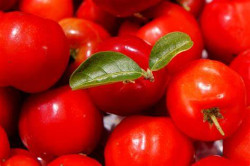Acerola - Tasigna (nilotinib) Interaction
Herbal: Acerola
Also Known As: Malpighia emarginata, Acerola Cherry, Barbados Cherry, Cereso, Cereza, Cerisier, Chereese, Grosella, Puerto Rican Cherry, Semeruco, West Indian Cherry, West Indies Cherry
Drug: nilotinib
Brand names:
Tasigna

Medical Content Editor Dr. Brian Staiger, PharmD
Last updated
Jun 22, 2025
Interaction Details
There were no interactions found between nilotinib and Acerola. This does not mean the potential for an interaction does not exist, however. There is often a lack of studies and data surrounding traditional medicine, especially concerning drug interactions, so it is important to always consult your provider before making any changes to your medication regimen.
Acerola Overview
 Acerola, also known as the Barbados cherry or West Indian cherry, is a small, red fruit that is native to Central and South America. The fruit is known for its high levels of vitamin C, which is a powerful antioxidant that can help to protect cells from damage caused by free radicals.
Acerola is commonly used as a supplement to increase vitamin C intake and it is available in various forms such as capsules, tablets, and powders. It is also often found in juice, jams, and other food products.
Acerola, also known as the Barbados cherry or West Indian cherry, is a small, red fruit that is native to Central and South America. The fruit is known for its high levels of vitamin C, which is a powerful antioxidant that can help to protect cells from damage caused by free radicals.
Acerola is commonly used as a supplement to increase vitamin C intake and it is available in various forms such as capsules, tablets, and powders. It is also often found in juice, jams, and other food products.
nilotinib Overview
-
Nilotinib is used to treat certain types of chronic myeloid leukemia (CML; a type of cancer of the white blood cells) who have recently found to have this condition in adults and children 1 year of age and older. It is also used to treat certain types of CML in adults whose disease could not be treated successfully with imatinib (Gleevec) or adults who cannot take imatinib because of side effects. Nilotinib is also used to treat certain types of CML in children 1 year of age or older whose disease could not be treated successfully with other tyrosine kinase inhibitor therapies or who cannot take these medications because of side effects. Nilotinib is in a class of medications called kinase inhibitors. It works by blocking the action of the abnormal protein that signals cancer cells to multiply. This helps to stop or slow the spread of cancer cells.
Acerola - More Interactions
Acerola interacts with 128 drugs
Interaction Rating Key
These severity listings are for informational use only. Never start, stop or otherwise change your therapy before speaking with your provider.
| Major | The combined use of these agents is strongly discouraged as serious side effects or other negative outcomes could occur. |
| Moderate | Use cautiously under the care of a healthcare professional or avoid this combination. A significant interaction or negative outcome could occur. |
| Minor | Be aware that there is a chance of an interaction. Watch for warning signs of a potential interaction. |
| Unknown | No interactions have been reported or no interaction data is currently available. |
Return to the main supplement interaction checker page
Parts of this content are provided by the Therapeutic Research Center, LLC.
DISCLAIMER: Currently this does not check for drug-drug interactions. This is not an all-inclusive comprehensive list of potential interactions and is for informational purposes only. Not all interactions are known or well-reported in the scientific literature, and new interactions are continually being reported. Input is needed from a qualified healthcare provider including a pharmacist before starting any therapy. Application of clinical judgment is necessary.
© 2021 Therapeutic Research Center, LLC
Drug descriptions are provided by MedlinePlus.
